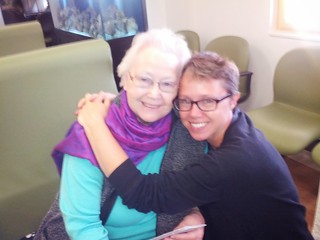‘These women walked directly into the fire and through it, and they did not have to. And that they did it even as some of the gay men they took care of treated them with bitchiness, scorn, and contempt.
‘It was, at the time, not at all unusual for gay men to snicker as the bull dyke walked into the bar with her overalls and flannels and fades. Much of the time, it was casual ribbing which they took in stride. But it could also be laced with acid, especially when lesbians began gravitating toward a bar that had until then catered largely to men.
‘When the AIDS crisis struck, it would be many of these same women who would go straight from their jobs during the day to acting as caregivers at night. Because most of them lacked medical degrees, they were generally relegated to the most unpleasant tasks: wiping up puke and shit, cleaning up houses and apartments neglected for weeks and months. But not being directly responsible for medical care also made them the most convenient targets for the devastating anger and rage these men felt – many who’d been abandoned by their own family and friends.
‘These women walked directly into the fire. They came to the aid of gay men even when it was unclear how easily the virus could be transmitted. Transmission via needlestick was still a concern, so they often wore two or three layers of latex gloves to protect themselves, but more than once I saw them, in their haste and frustration, dispense with the gloves so that they could check for fevers, or hold a hand that hung listlessly from the edge of a bed whose sheets they had just laundered.
‘They provided aid, comfort, and medical care to men withering away in hospices, men who’d already lost their lovers and friends to the disease and spent their last months in agony. They’d been abandoned by their own families, and were it not for lesbians – many if not most of them volunteers – they would have suffered alone. And when there was nothing more medicine could do for them and their lungs began to fill with fluid, it was often these same women who’d be left to administer enough morphine to release them, given to them by the doctor who had left the room and would return 15 minutes later to sign the certificate (a common practice at the time).
‘I knew a woman around that time who’d had at one point been making bank in construction. But at the outset of the AIDS crisis she had abandoned her career to pursue nursing instead, and was close to her degree when we were hanging out. She was a big, hearty drinker, and fortunately so was I. We’d been utterly thrashed at a bar once when someone whispered a fairly benign but nonetheless unwelcoming comment about her. Middle fingers were exchanged, and afterwards, furious and indignant, I asked her, Why do you do it? Why did you abandon a career to take care of these assholes who still won’t pay you any respect?
‘She cut me a surprisingly severe look, held it and said, “Honey, because no one else is going to do it.” I remember feeling ashamed after that, because my fury and indignation weren’t going to clean blood and puke off the floor; it wasn’t going to do the shit that needed to get done.
‘HIV killed my friends, took my lover from me, and tore up my life. During that time, I did what I could. But nothing I did then or have ever been called to do in my life puts me anywhere near the example set by the lesbians I knew in the 80s and 90s. I’ve felt obligated to remember what they did, and to make sure other people remember it too.’


